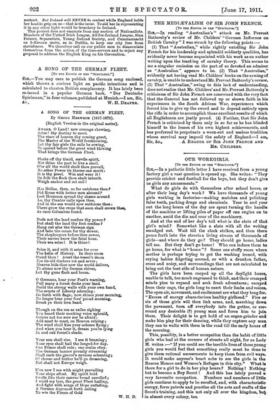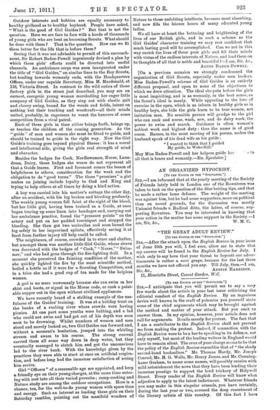OUR WORKGIRLS.
[To THE EDITOR 07 THE " SPECTATOR."'
SIR,—In a pathetic little letter I have received from a young factory girl a vast question is opened up. She writes : " They provide cricket and football for the boys, but they don't give us girls any amusements."
What do girls do with themselves after school hours, or after their long day's work ? We have thousands of young girls working in factories—making matches and polishing false teeth, packing drugs and chemicals. Year in and year out the long hours of the day are spent turning the handle of the machine or lifting piles of paper off one engine on to another, amid the din and roar of the machinery.
And at the end of her day's toil what is the state of that girl's mind ? Somewhat like a slate with all the writing smudged out. Wait till the clock strikes, and then there pours forth into the streets a living stream of thousands of girls—and where do they go ? They should go home, ladies
tell me. But they don't go home ! Who can induce them to
go home, for what is "home "? Some one stuffy room where mother is perhaps trying to get the washing ironed, with crying babies fidgeting around, or with a drunken father, cross and noisy, and surroundings that are not calculated to bring out the best side of human nature.
The girls have been cooped up all the daylight hours, unable to talk, too much engrossed to think, and their cramped minds pine to expand and seek fresh adventures ; escaped from their cage, the girls long to exert their limbs and voices. The open air, movement, and excitement are what they long for,.
"Excess of energy characterizes healthy girlhood." Five or six of these girls will then link arms, and, marching down the pavement, turn off everybody into the gutter, or sun.
round any desirable (?) young man and force him to join them. Their delight is to get hold of an organ-grinder and make him play for their dancing, while they capture any man they can to waltz with them in the road till the early hours of the morning.
This, possibly, is a better occupation than the habit of little girls who loaf at the corners of streets all night, for as Lady M. writes :--" If you could see the terrible lives of these young girls you would feel that something really must be done to give them rational amusements to keep them from evil ways. It would make anyone's heart ache to see the girls in the Rescue Homes and Women's Refuges in this city." What is there for a girl to do in her play hours P Nothing ! Nothing but to become a Boy Scout ! And this has lately proved a very favourite occupation. Numbers and numbers of little girls continue to apply to be enrolled, and, with characteristic energy, form patrols and practise all the arts and crafts of the Scout's training, and this not only all over the kingdom, but in almost every colony, too.
Outdoor interests and hobbies are equally necessary to healthy girlhood as to healthy boyhood. People have asked, " What is the good of Girl Guides ? " But that is not the question. Here we are face to face with a horde of thousands of young girls who are bent on becoming Scouts. What should be done with them P That is the question. How can we fit them better for the life that is before them P Seeing that it was not advisable to permit of this encroach- ment, Sir Robert Baden-Powell ingeniously devised a plan by which these girls' efforts could be diverted into useful channels. An ambulance corps was soon inaugurated under the title of "Girl Guides," on similar lines to the Boy Scouts, but tending towards womanly ends, with the Headquarters Offices, under our capable Secretary, Miss M. Macdonald, at 116, Victoria Street. In contrast to the wild antics of those factory girls in the street just described, you may see an earnest, energetic young woman marshalling her eager little company of Girl Guides, as they step out with elastic gait and cheery swing, bound for the woods and fields, intent on nothing but their tracking and woodcraft—all their minds united, probably, in eagerness to wrest the honours of some competition from a rival patrol.
Each of these girls in time either brings forth, brings up, or teaches the children of the coming generation. As the " guide " of men and women she must be fitted to guide, and should be trained to guide in the right way. Now the Girl Guide's training goes beyond physical fitness : it has a moral and intellectual side, giving the girls real strength of mind and character.
Besides the badges for Cook, Needlewoman, Nurse, Laun- dress, Dairy, those badges she wears do not represent all that a Guide learns. First and foremost comes the lesson of helpfulness to others, consideration for the weak and the obligation to do "good turns." The three "promises" a girl makes on joining include loyalty to God and King and trying to help others at all times by doing a kind action.
A boy was carried into his mother's cottage the other day, after an accident, with his leg broken and bleeding profusely. The weakly young woman fell faint at the sight of the blood, but her little girl, having been trained as a Guide, at once began tearing up some linen into bandages and, carrying out her ambulance practice, found the "pressure points" on the artery and put on her padded tourniquet and stopped the bleeding. She then got two umbrellas and soon bound the leg safely to her improvised splints, effectively saving it at least from further injury till help could be called.
The neighbours, of course, crowded in to stare and chatter, but amongst them was another little Girl Guide, whose sleeve was decorated with the badges of "Cook," "Nurse," " Swim- mer," and who had gone through the fire-lighting drill. In a moment she perceived the fainting condition of the mother, she quickly lighted the fire by the most scientific method, boiled a kettle as if it were for a Scouting Competition, and in a trice she had a good cup of tea made for the helpless woman.
A girl is no more unwomanly because she can swim in her skirt and boots, or signal in the Morse code, or cook a palat- able supper out in the open without civilized appliances.
We have recently beard of a striking example of the use- fulness of the Guides' training. It was at a holiday treat on the banks of a rushing river where crowds were having picnics. At one part some youths were bathing, and a lad who could not swim and had got out of his depth was soon seen to be drowning. Whilst numbers of women and men stOod and merely looked on, two Girl Guides ran forward and, without a moment's hesitation, jumped into the whirling stream and swam to his rescue. The strong current carried them all some way down in deep water, but they eventually managed to clutch him and got the unconscious lad to the river bank. With the knowledge given by the practices they were able to start at once on artificial respira- tion, and before long had the immense satisfaction of seeing him revive.
Girl " Officers " of a reasonable age are appointed, and keep a friendly eye on their young charges, at the same time enter- ing with zest into all their varied pursuits ; camp-cooking and Nature study are among the outdoor occupations. Here is a chance, too, for the well-to-do young women with spare time and energy. Such an interest as leading these girls on their Saturday rambles, pointing out the manifold wonders of Nature to these unfolding intellects, becomes most absorbing, and now fills the leisure hours of many educated young ladies.
We all have at heart the bettering and brightening of the lives of our British girls, and in such a scheme as the Girl Guides' character training we may rest confident that much lasting good will be accomplished. Can we not in this way enrich the lives of these poor girls and fill their minds with vistas of the endless interests of Nature, and lead them on to thoughts of all that is noble and beautiful P—I am, Sir, &c.,
AGNES BADEN-POWELL.
[On a previous occasion we strongly condemned the organization of Girl Scouts, especially under men leaders. Miss Baden-Powell's scheme of Girl Guides is an entirely different proposal, and open to none of the objections to which we drew attention. The ideal she puts before the girls is most inspiriting, and is as womanly, in the best sense, as the Scout's ideal is manly. While appealing to the love of exercise in the open, which is as inborn in healthy girls as in healthy boys, she bids the girls learn to be true women, not imitation men. No sensible person will grudge to the girl who can cook and nurse, wash, sew, and do dairy work, the power to swim and march. Guidance is often woman's noblest work and highest duty : thus the name is of good omen. Barnes, in the most moving of his poems, makes the husband speak of his dead wife as his guide :
"I wanted to think that I guided
My guide, to Woke-Hill."
May Miss Baden-Powell and her helpers guide her s to
all that is brave and womanly.—ED. Spectator.]











































 Previous page
Previous page